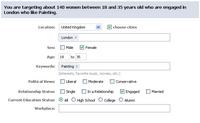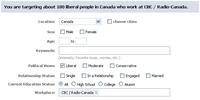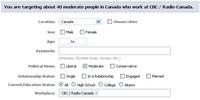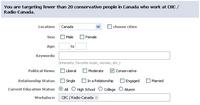Often when writing this blog I try and wear two hats: one of a reporter and one of a conservative critic. If I get whiff of a good story, I’ll do my best to investigate and be first to put it out there for public consumption. As an advocate of blogging as a new reporting medium, I will say that I am thrilled when I see big stories break on blogs before the so-called mainstream media goes to air/print.
Last night, I received word from someone that works in media that a press release from the High Commissioner was just starting to hit the email boxes of fellow reporters in Ottawa. As I’m not usually on the press contact list of most organizations, I called the Pakistani High Commission to confirm the story. They referred me to the press officer who had already gone home for the evening. Likely expecting a number of media calls that evening, the commission passed on the officer’s home number which I called. When speaking with the press officer, I only inquired as to whether a statement or release had been authored concerning “Mr. Dion’s remarks on Pakistan and NATO” and requested that a copy be emailed to me. They informed me that they had in fact just penned a release and that they would email me a copy.
Some people have emailed me with concerns that by calling the High Commission, I brought attention to a news story of which they would have otherwise not been aware. This is laughable and quite insulting to the professionalism of diplomatic staff whose job it is is to track the host country’s political scene in order to report developments which concern their government. Stephane Dion’s statements regarding NATO and possible “forces” being introduced into Pakistan were already published in the Ottawa Citizen and I’m quite certain that the diplomatic staff reads the papers (and watches the news. The story was on both Mike Duffy and Newman last night). I did nothing to suggest to the Pakistani High Commission that Mr. Dion’s statements were inappropriate; I simply expressed to them that I wanted to be cc’d on the release that they were only starting to send out.
I believe that I was the first to publish the release. Minutes later on his blog, David Akin published it too. My blog beat the CP wire by an hour on a breaking news story. The story’s value was “very high” as Canada has important security interests in central Asia and that a man seeking the office of the Prime Minister had apparently taken a new track on proposed Canadian foreign policy. While I may have been first to break news of the release, it is unfair to say that the mainstream media was negligent or uninterested in reporting on the story. After I posted on the story last night, I benefited from discussions with one of Ottawa bureau chiefs and two other Ottawa reporters. To Peter Mansbridge’s credit, the CBC anchor used a scheduled Mansbridge One-on-One taping the same day to press Dion (and hard) on his statement and to ask him about Pakistan’s condemnation of Dion’s remarks.
As for the partisan statements that I made on this blog concerning the release: I do believe in what I wrote. In fact, much of it mirrors and complements what I have previously said. I think that Canadians should set a very high standard for their applicants to executive and legislative powers, especially when it comes to matters of national defense and foreign policy.
As for Conservatives “taking advantage” of Mr. Dion’s statements or positions? This does nothing to hurt foreign relations as Mr. Harper is the Prime Minister and such high level diplomatic/military transactions cross his desk and not that of Mr. Dion. Despite this, it is the responsible duty of our party-based political system to discuss/debate and sometimes ridicule the positions of opponents. As Canadians, we charge our elected representatives with pursing our interests and those of Canada, and anything less than challenging a new proposed track on foreign policy would be irresponsible and a betrayal to our principles of informed debate, the foundation of our democracy. Parties are the method by which discussion is focused and made effective. Rather than having 308 independent and non-cohesive message tracks, we more effectively debate a handful at a time. It is the duty of parties to propose new ideas and the duty of other parties to put those ideas through the test of intense debate.
The Conservatives can hardly be blamed for both debating what appeared to be Mr. Dion’s divergent foreign policy proposal, and they cannot be blamed for taking the Liberal leader at his literal word. Now Mr. Dion has said that he means “diplomacy” and not “force” even though he called for considering “NATO forces” in Pakistan. Either one of two things then happened. Mr. Dion either realized the faults of his proposal and climbed down in the face of being battered on an already weak file of his. Or the Liberal leader misspoke, which is known to happen. However, misinterpreting Dion’s intent based on his words has really only been known to happen in English. Is it possible that Mr. Dion made a gaffe in French about an issue that was on the top of his mind (he had just come back from his first trip to Afghanistan)? It’s possible, but its not probable. I believe that Mr. Dion was proposing a new track even if it’s a proposal for others to help develop his ideas. And in this, I honestly believe that this is where one of Mr. Dion’s political faults lies; he takes an academic approach which is better suited to the safe environment of a “what-if” university seminar. Such an environment is the incubator to under-developed ideas and untested policy proposals. The national stage is no place to “spitball” ideas.
Some will say that they’ve found it refreshing to hear a Canadian politician “tell it like it is on Pakistan” and “say what we’ve all been thinking”. Pakistan has been a laggard when it comes to taking care of the radical elements in its western province. Like most Canadians, I am concerned about our inability to address this problem directly. Yet, Pakistan is a sovereign country that has the jurisdiction over its own security. Most Canadians would agree that the only scenarios that would allow military presence within Pakistan’s borders would be either with the permission of the Pakistani government, or with a broad international consensus to violate Pakistan’s sovereignty. The Pakistani government is not about to allow any western nation to put our soldiers on the ground there (this is a well known sentiment of the Musharraf government – so it is surprising that Mr. Dion suggested this). Further, the UN is not on the verge on granting any military the authority to violate Pakistan’s sovereignty. Mr. Dion’s statements were ill-conceived and more theoretical than practical in nature.
For Canadian security in central Asia, Pakistan needs a stable administration. If it’s democratic, all the better. But, the “nuance” here is that if Western troops go in, it’ll tip the population of Pakistan away from Musharraf, and away from Bhutto’s PPP and towards radical elements. Having Americans in Saudi Arabia supposedly radicalized Osama bin Laden against the West, so suggesting something half-baked (but on the very surface, quite logical until you dig deeper) is irresponsible of Dion and especially for a man who is supposedly advised on these matters. As a privy counselor, former member of cabinet and leader of the Opposition, Dion receives security briefings. Since Pakistan stability is a key buttress against the whole of central Asia collapsing, Dion made an unfortunate error in making such a weakly-considered statement as the Pakistani media picked up comments from the Canadian opposition leader, named him as the likely winner of the future election and claim that his policy musings will be the Canadian agenda in a matter of weeks or months.
Dion, of course has the right to make such statements however inappropriate they may be. But it is the duty of partisans of all stripes to put his ideas through the machinations of public debate in order for Canadians to be best served.





